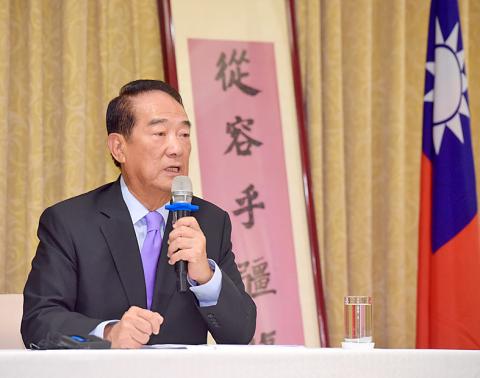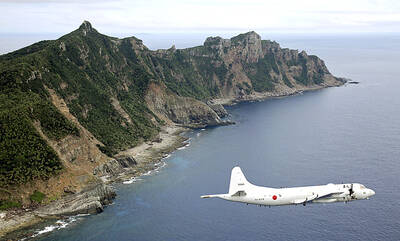People First Party (PFP) Chairman James Soong (宋楚瑜) yesterday said that President Tsai Ing-wen (蔡英文) selecting him to be her special envoy at this year’s APEC leaders’ summit was a demonstration of her “maximum goodwill” to Beijing, acknowledging that he had communicated with China about the matter prior to the announcement of his appointment.
Soong made the remarks at a news conference at the Evergreen Laurel Hotel Taipei, where in March the PFP chairman had his first meeting with Tsai after her victory in the Jan. 16 presidential election.
“By appointing me, Tsai has shown a high level of goodwill. If Beijing cannot accept a person like me, how would there be any hope of peaceful cross-strait development?” Soong said.

Photo: Huang Yao-cheng, Taipei Times
Soong said Tsai asked him to represent her at the annual summit during a meeting at the Presidential Office on Aug. 4, but he did not accept the offer immediately due to the importance of the mission.
He decided to take up the challenge after careful deliberation, Soong said.
“The appointment fills me with a deep sense of responsibility. It is a mission rather than a job. This mission is not about personal glory, but the entrustment of a responsibility to present to the international community the achievements Taiwan has made in the past decades,” Soong said.
Asked whether Beijing was aware of Tsai’s decision before it was announced on Wednesday, Soong acknowledged that he had communicated with China, but declined to reveal any details.
As for how he plans to react if he meets Chinese President Xi Jinping (習近平) at the summit, which is to be held in Peru next month, Soong said the summit would serve as a good opportunity for him to meet with Xi.
“If we are able to have more interaction and get to know about each other better at an international event, we will be able to assuage misunderstanding and reach reconciliation,” Soong said.
However, Soong added that it was premature to say how any potential meeting with Xi would be conducted.
“We should not open the lid of a cooker before the rice is fully cooked,” he said.
Soong also shrugged off concerns about his and the president’s conflicting opinions about the so-called “1992 consensus,” saying that he is capable of separating his personal views and the mission entrusted to him by the government.
“Since I am going to represent the president, I will know how far to go and when to stop when it comes to cross-strait issues,” Soong said.
The “1992 consensus” refers to a tacit understanding between the Chinese Nationalist Party (KMT) and Beijing that both sides of the Taiwan Strait acknowledge there is “one China,” with each side having its own interpretation of what “China” means.
Former Mainland Affairs Council chairman Su Chi (蘇起) admitted to making up the term in 2000.
Tsai’s refusal to accept the “1992 consensus” has resulted in punitive measures from Beijing, including suspending official cross-strait communication mechanisms, squeezing Taiwan’s international space and reducing the number of Chinese tourists visiting Taiwan.

MISINFORMATION: The generated content tends to adopt China’s official stance, such as ‘Taiwan is currently governed by the Chinese central government,’ the NSB said Five China-developed artificial intelligence (AI) language models exhibit cybersecurity risks and content biases, an inspection conducted by the National Security Bureau (NSB) showed. The five AI tools are: DeepSeek, Doubao (豆包), Yiyan (文心一言), Tongyi (通義千問) and Yuanbao (騰訊元寶), the bureau said, advising people to remain vigilant to protect personal data privacy and corporate business secrets. The NSB said it, in accordance with the National Intelligence Services Act (國家情報工作法), has reviewed international cybersecurity reports and intelligence, and coordinated with the Ministry of Justice Investigation Bureau and the National Police Agency’s Criminal Investigation Bureau to conduct an inspection of China-made AI language

LIMITS: While China increases military pressure on Taiwan and expands its use of cognitive warfare, it is unwilling to target tech supply chains, the report said US and Taiwan military officials have warned that the Chinese People’s Liberation Army (PLA) could implement a blockade within “a matter of hours” and need only “minimal conversion time” prior to an attack on Taiwan, a report released on Tuesday by the US Senate’s China Economic and Security Review Commission said. “While there is no indication that China is planning an imminent attack, the United States and its allies and partners can no longer assume that a Taiwan contingency is a distant possibility for which they would have ample time to prepare,” it said. The commission made the comments in its annual

‘TROUBLEMAKER’: Most countries believe that it is China — rather than Taiwan — that is undermining regional peace and stability with its coercive tactics, the president said China should restrain itself and refrain from being a troublemaker that sabotages peace and stability in the Indo-Pacific region, President William Lai (賴清德) said yesterday. Lai made the remarks after China Coast Guard vessels sailed into disputed waters off the Senkaku Islands — known as the Diaoyutai Islands (釣魚台) in Taiwan — following a remark Japanese Prime Minister Sanae Takaichi made regarding Taiwan. Takaichi during a parliamentary session on Nov. 7 said that a “Taiwan contingency” involving a Chinese naval blockade could qualify as a “survival-threatening situation” for Japan, and trigger Tokyo’s deployment of its military for defense. Asked about the escalating tensions

DISPUTE: A Chinese official prompted a formal protest from Tokyo by saying that ‘the dirty head that sticks itself out must be cut off,’ after Takaichi’s Taiwan remarks Four armed China Coast Guard vessels yesterday morning sailed through disputed waters controlled by Japan, amid a diplomatic spat following Japanese Prime Minister Sanae Takaichi’s comments on Taiwan. The four ships sailed around the Senkaku Islands — known as the Diaoyutai Islands (釣魚台) to Taiwan, and which Taiwan and China also claim — on Saturday before entering Japanese waters yesterday and left, the Japan Coast Guard said. The China Coast Guard said in a statement that it carried out a “rights enforcement patrol” through the waters and that it was a lawful operation. As of the end of last month,